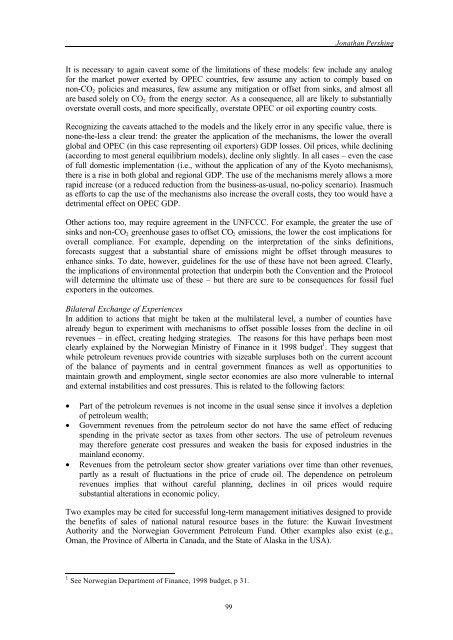sectoral economic costs and benefits of ghg mitigation - IPCC
sectoral economic costs and benefits of ghg mitigation - IPCC
sectoral economic costs and benefits of ghg mitigation - IPCC
You also want an ePaper? Increase the reach of your titles
YUMPU automatically turns print PDFs into web optimized ePapers that Google loves.
Jonathan Pershing<br />
It is necessary to again caveat some <strong>of</strong> the limitations <strong>of</strong> these models: few include any analog<br />
for the market power exerted by OPEC countries, few assume any action to comply based on<br />
non-CO 2 policies <strong>and</strong> measures, few assume any <strong>mitigation</strong> or <strong>of</strong>fset from sinks, <strong>and</strong> almost all<br />
are based solely on CO 2 from the energy sector. As a consequence, all are likely to substantially<br />
overstate overall <strong>costs</strong>, <strong>and</strong> more specifically, overstate OPEC or oil exporting country <strong>costs</strong>.<br />
Recognizing the caveats attached to the models <strong>and</strong> the likely error in any specific value, there is<br />
none-the-less a clear trend: the greater the application <strong>of</strong> the mechanisms, the lower the overall<br />
global <strong>and</strong> OPEC (in this case representing oil exporters) GDP losses. Oil prices, while declining<br />
(according to most general equilibrium models), decline only slightly. In all cases – even the case<br />
<strong>of</strong> full domestic implementation (i.e., without the application <strong>of</strong> any <strong>of</strong> the Kyoto mechanisms),<br />
there is a rise in both global <strong>and</strong> regional GDP. The use <strong>of</strong> the mechanisms merely allows a more<br />
rapid increase (or a reduced reduction from the business-as-usual, no-policy scenario). Inasmuch<br />
as efforts to cap the use <strong>of</strong> the mechanisms also increase the overall <strong>costs</strong>, they too would have a<br />
detrimental effect on OPEC GDP.<br />
Other actions too, may require agreement in the UNFCCC. For example, the greater the use <strong>of</strong><br />
sinks <strong>and</strong> non-CO 2 greenhouse gases to <strong>of</strong>fset CO 2 emissions, the lower the cost implications for<br />
overall compliance. For example, depending on the interpretation <strong>of</strong> the sinks definitions,<br />
forecasts suggest that a substantial share <strong>of</strong> emissions might be <strong>of</strong>fset through measures to<br />
enhance sinks. To date, however, guidelines for the use <strong>of</strong> these have not been agreed. Clearly,<br />
the implications <strong>of</strong> environmental protection that underpin both the Convention <strong>and</strong> the Protocol<br />
will determine the ultimate use <strong>of</strong> these – but there are sure to be consequences for fossil fuel<br />
exporters in the outcomes.<br />
Bilateral Exchange <strong>of</strong> Experiences<br />
In addition to actions that might be taken at the multilateral level, a number <strong>of</strong> counties have<br />
already begun to experiment with mechanisms to <strong>of</strong>fset possible losses from the decline in oil<br />
revenues – in effect, creating hedging strategies. The reasons for this have perhaps been most<br />
clearly explained by the Norwegian Ministry <strong>of</strong> Finance in it 1998 budget 1 . They suggest that<br />
while petroleum revenues provide countries with sizeable surpluses both on the current account<br />
<strong>of</strong> the balance <strong>of</strong> payments <strong>and</strong> in central government finances as well as opportunities to<br />
maintain growth <strong>and</strong> employment, single sector economies are also more vulnerable to internal<br />
<strong>and</strong> external instabilities <strong>and</strong> cost pressures. This is related to the following factors:<br />
• Part <strong>of</strong> the petroleum revenues is not income in the usual sense since it involves a depletion<br />
<strong>of</strong> petroleum wealth;<br />
• Government revenues from the petroleum sector do not have the same effect <strong>of</strong> reducing<br />
spending in the private sector as taxes from other sectors. The use <strong>of</strong> petroleum revenues<br />
may therefore generate cost pressures <strong>and</strong> weaken the basis for exposed industries in the<br />
mainl<strong>and</strong> economy.<br />
• Revenues from the petroleum sector show greater variations over time than other revenues,<br />
partly as a result <strong>of</strong> fluctuations in the price <strong>of</strong> crude oil. The dependence on petroleum<br />
revenues implies that without careful planning, declines in oil prices would require<br />
substantial alterations in <strong>economic</strong> policy.<br />
Two examples may be cited for successful long-term management initiatives designed to provide<br />
the <strong>benefits</strong> <strong>of</strong> sales <strong>of</strong> national natural resource bases in the future: the Kuwait Investment<br />
Authority <strong>and</strong> the Norwegian Government Petroleum Fund. Other examples also exist (e.g.,<br />
Oman, the Province <strong>of</strong> Alberta in Canada, <strong>and</strong> the State <strong>of</strong> Alaska in the USA).<br />
1 See Norwegian Department <strong>of</strong> Finance, 1998 budget, p 31.<br />
99
















